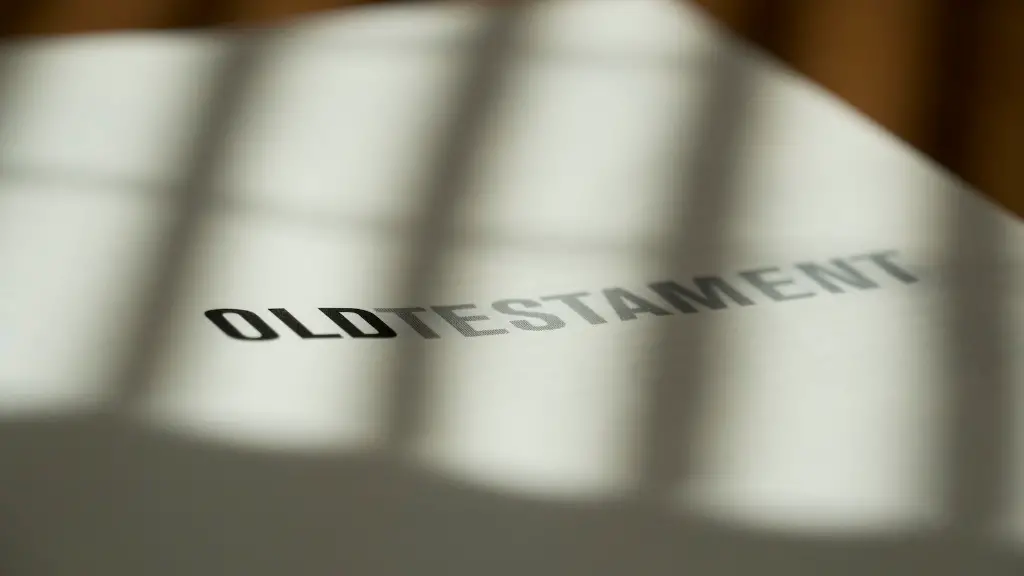Goliath’s Role in the Bible
Goliath plays an integral role in the Bible, appearing in the text of 1 Samuel 17 as a physically intimidating giant of a man, who is killed by young shepherd David. Being one of the earliest examples of a Biblical ‘hero’, Goliath’s story has intrigued generations, prompting further discussion and debate among Biblical scholars, historians and theologians.
At the time of Goliath, the Philistines and the Israelites were at war, with the Philistines occupying territories on the western coast of the Land of Israel. In 1 Samuel 17, the story is set on a battlefield adorned with two armies and a single powerful enemy. From the Philistine side steps Goliath, and it is here that his intimidating reputation is established. In 1 Samuel 17:4-7 we are told that, “he was over 9 feet tall”, that he wore “a bronze helmet” and “a coat of scale armor weighing five thousand shekels”. Such descriptions help to create a powerful image of Goliath in the mind of the reader and highlight the sense of peril that hangs in the air.
Theologians have debated Goliath’s character and his role in the Bible. For some, Goliath is seen as an immoral character, a representation of the Philistines and their wicked ways. Conversely, others have argued that his character demonstrated an understanding of justice. Regardless of one’s opinion of Goliath, it is hard to deny the sheer emotional impact of the story. Few readings in the Bible evoke the same level of tension, drama and anticipation that we see in the story of Goliath.
It is the battle with David that we ultimately reflect on. This encounter shows a great divide between the two adversaries. On one hand we have Goliath boasting of his power, wearing a full set of armour, standing 9 feet tall – a physical setup that serves to intimidate opponents. On the other hand, we have David, wearing no armour and carrying only a staff and a sling – a powerful symbol of a heroic figure displaying admirable courage in the face of such a formidable opponent.
David’s victory will forever remain an iconic moment in the Bible – the small, seemingly insignificant young shepherd is the victor over the giant, the warrior. This concept of seemingly powerless characters defeating powerful characters has been used time and time again throughout the Bible, and more widely, in books and films, as a powerful tool to captivate readers and viewers.
The story of Goliath, even to this day, remains primarily topical. It is a testament to the beauty and power of language that this story of David and Goliath still captivates readers centuries after it was first penned down.
The Legacy of Goliath’s Defeat
Goliath’s defeat is remembered as one of the most famous stories from the Bible and is an often-cited example of faith triumphing over physical power. In the story of David and Goliath, it is not the physical size of Goliath, but the strength of David’s faith that enables him to defeat Goliath. From a Christian perspective, this victory serves as a lesson on the power of faith – that trusting in the Lord is the ultimate source of power and strength that can overcome even the mightiest of physical opponents
The story of Goliath’s defeat has become one of the most well-known Biblical stories and has been used as an important cultural reference. In modern culture, references to the story of David and Goliath are often used as a metaphor for triumph in the face of adversity – a powerful message of victory in the face of impossibly challenging odds. This is a message that resonates strongly with many people, as it provides a sense of hope that, even in times of adversity, victory can still be achieved.
Goliath himself has also been used as a powerful figure in modern culture, often taking on a ‘villain’ role. The look of power and intimidation that Goliath carries has been used in many media formats, sometimes as allegorical references to larger issues such as social or gender oppression. By using Goliath as a symbol for oppression, writers are able to leverage the symbolism of David’s defeat to help bring emphasis and power to the story being told.
The story of Goliath’s defeat has been adapted in various forms, with many books and films attempting to capture the power of the original story. Though much of the original story remains intact, these adaptations have often shifted the emphasis of the story to different points of view, making it accessible to a larger audience and challenging the reader to think in new ways.
The story of Goliath, even centuries later, is still a powerful and influential tale. The idea of a hero overcoming the impossible still resonates with many people and has influenced culture, literature and art in powerful ways. Goliath’s role in the Bible is an important one, providing an interesting and complex look into the power of faith and the power of story.
Goliath’s Presence in the Old Testament
Goliath boasts a major presence in the Old Testament, appearing in several books, including 2 Samuel, 1 Chronicles, and among others. Goliath’s presence in these books, however, is not all equal. While Goliath appears in both 1 Samuel and 2 Samuel, only 1 Samuel recounts the story of Goliath’s confrontation with David – the primary focus of Goliath’s role in the Bible. Other books in the Old Testament, such as 2 Samuel, provide supplemental details and background of this timeline, but the majority of Goliath’s presence in the Bible comes from his characterization in 1 Samuel.
In the Old Testament Goliath appears in situ in two separate stories. While these two stories are related in the overall timeline, Goliath’s role in each story is quite different. In 1 Samuel, Goliath is a menacing and intimidating figure that confronts the Israelites and challenges them to single combat. On the other hand, in 2 Samuel, Goliath is presented in a less villainous form. Instead of being a conqueror, Goliath is a character that challenges David to think in different ways and serves as a spiritual mentor in David’s development.
Regardless of Goliath’s perceived role in the Bible, it is clear that the character of Goliath has been quite influential. Goliath stands as one of the most iconic figures in the Bible, with his story going beyond the scope of the Old Testament. Goliath’s character has been used in popular culture to evoke powerful emotions and provide viewers with an inspiring story of overcoming seemingly insurmountable odds.
Further, Goliath has been used in literary devices since antiquity, and continues to be a powerful symbol used in art, literature, and storytelling. His legacy, firmly rooted in the Old Testament, makes Goliath an important figure in the Bible – one that continues to be studied and analyzed by modern theologians and historians.
Goliath and the Politics of Antagonism
Goliath, in the Bible, plays a significant role in the political landscape of the time. In 1 Samuel, Goliath serves as a representation of the political and military hegemony of the Philistines, with Goliath being a mirror image of the power of Philistine rule. In this way, Goliath’s presence in the text serves to provide a visual representation of the politics of Biblical antiquity.
For this reason, Goliath has been seen as a source of political unrest throughout the text. His presence in the Bible, paired with David’s miraculous victory over Goliath, has been seen by some as a symbol of the power of the Israelites and their subjugation of the Philistines. Further, Goliath’s defeat by David has been seen as a symbol of a people rising up against unjust rule. This view has been expanded to modern times, with Goliath’s defeat being seen as a symbol of hope for those seeking justice in oppressive situations.
In modern times, this theme of a single figure standing up against oppressive rule is seen in books, movies, and television shows. For example, Katniss Everdeen in the the Hunger Games series is one such figure, a single person is able to challenge oppressive power. This theme is similar to that seen in the story of David and Goliath, and serves to demonstrate the power and influence of Goliath’s story in the Bible.
Goliath’s role in the Bible, as a representation of political oppression and righteous indignation, carries on to this day. His story has been one of the main sources of inspiration for generations, providing a symbol of hope that victory can be achieved in the face of terrible odds. In this way, Goliath serves not just as a symbol of oppression, but of hope and the power of conviction.
Goliath’s Spiritual Significance
The story of Goliath has a deep spiritual component, and one that is highly revered within Christian tradition. The story of David and Goliath is seen as a symbol of faith and trust in God – that God can provide strength and courage even in the darkest hours. In this sense, Goliath is seen as a powerful symbol of faith and humility, as David is ultimately victorious over Goliath through his trust and faith in the Almighty.
From a Christian perspective, Goliath serves as a symbol of the power of faith and trust in the Lord. The story of David and Goliath serves to demonstrate the power of faith and to set an example for believers. David’s trust in the Lord is rewarded with victory over Goliath – a powerful message for believers.
Goliath’s spiritual significance extends to modern culture as well. The story of David and Goliath is often cited as an example of faith overcoming adversity – a message that is relevant in modern society, as many times adversity appears insurmountable. In this way, Goliath’s character serves as a powerful symbol for believers, providing a message of hope and victory in the face of adversity.
Goliath’s spiritual significance can also be seen in his characterization in the Bible. While some view Goliath as a villain, others have argued that his character reflects an understanding of justice, making him a complex and exciting figure. Regardless of one’s opinion of Goliath, his impact on the spiritual landscape of the Bible is undeniable.
Goliath’s spiritual impact, rooted in the story of David and Goliath, is an important aspect of the Bible. His iconic victory, achieved through trust and faith in the Lord, serves as an example to believers and a powerful symbol of victory over adversity.
Goliath’s Impact on Theological Discussions
Goliath’s impact on theological discussion is significant. Goliath’s character is seen as a reflection of the power of faith, a symbol of justice, and a representation of the political turmoil of the time. As such, G





